Small overlap front: driver-side
Rating applies to 2009-16 models
Tested vehicle: 2012 Audi A4 2.0T Premium 4-door 2wd
The Audi A4 was redesigned for the 2009 model year. Two tests of the A4 were conducted because, in the first test, the vehicle's electrical system did not deploy the airbags due to a crash test preparation error. As a result, ratings for restraints and dummy kinematics and dummy injuries are based only on the second test. Structural ratings are based on both tests.
| Overall evaluation | |
|---|---|
| Structure and safety cage | |
| Driver injury measures | |
| Head/neck | |
| Chest | |
| Hip/thigh | |
| Lower leg/foot | |
| Driver restraints and dummy kinematics In the second test, the dummy’s head contacted the frontal airbag but slid off the left side as the steering column moved 18 cm to the right, leaving the head vulnerable to contact with forward structure and resulting in little airbag cushioning for the chest. The side curtain airbag deployed and had sufficient forward coverage to protect the head from contact with side structure and outside objects. The driver door opened during the crash, which shouldn't happen because the driver could be partly or completely ejected from the vehicle. |
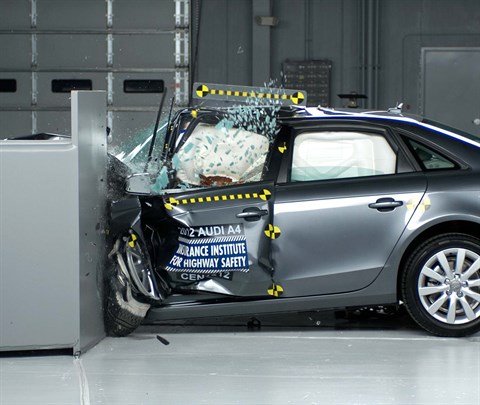
Action shot taken during the second of two small overlap frontal crash tests.
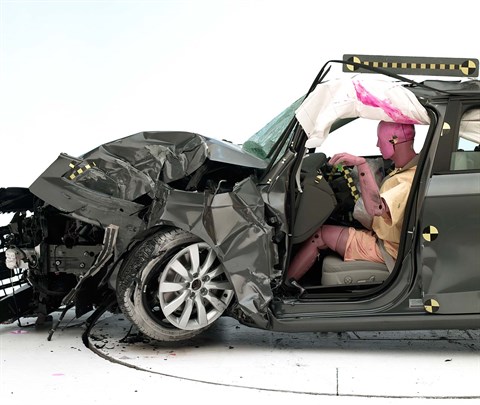
The dummy's position in relation to the door frame, steering wheel, and instrument panel after the crash test indicates the driver's survival space wasn't maintained well (second test with front and side curtain airbag deployment).
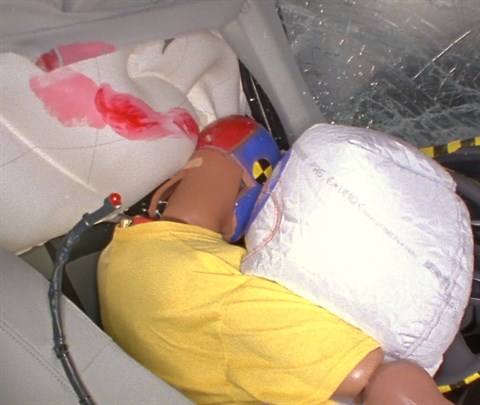
In the second test, the dummy moved to the left and its head slid around the left side of the frontal airbag.
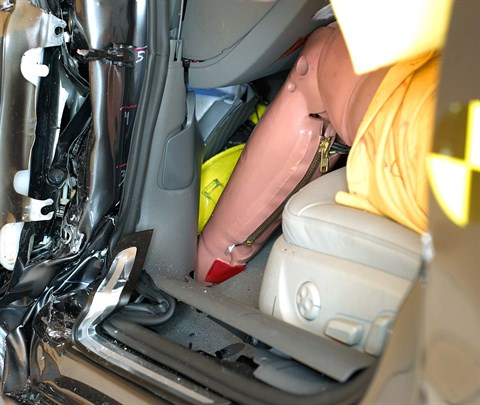
Extensive intrusion by the instrument panel and footwell contributed a high risk of injury to the dummy's left hip.
Measures of occupant compartment intrusion on driver side
| Test ID | CEN1208 | CEN1212 |
|---|---|---|
| Lower occupant compartment | ||
| Lower hinge pillar max (cm) | 27 | 24 |
| Footrest (cm) | 29 | 26 |
| Left toepan (cm) | 20 | 18 |
| Brake pedal (cm) | 10 | 10 |
| Parking brake (cm) | 0 | 0 |
| Rocker panel lateral average (cm) | 4 | 3 |
| Upper occupant compartment | ||
| Steering column | 13 | |
| Upper hinge pillar max (cm) | 26 | 24 |
| Upper dash (cm) | 30 | 26 |
| Lower instrument panel (cm) | 31 | 23 |
Driver injury measures
| Test ID | CEN1212 |
|---|---|
| Head | |
| HIC-15 | 89 |
| Peak gs at hard contact | no contact |
| Neck | |
| Tension (kN) | 1.5 |
| Extension bending moment (Nm) | 5 |
| Maximum Nij | 0.33 |
| Chest maximum compression (mm) | 31 |
| Femur (kN) | |
| Left | 8.6 |
| Right | 1.2 |
| Knee displacement (mm) | |
| Left | 1 |
| Right | 6 |
| Knee-thigh-hip injury risk (%) | |
| Left | 53 |
| Right | 0 |
| Maximum tibia index | |
| Left | 0.63 |
| Right | 0.62 |
| Tibia axial force (kN) | |
| Left | 1.6 |
| Right | 1.7 |
| Foot acceleration (g) | |
| Left | 90 |
| Right | 98 |
Moderate overlap front: original test
Rating applies to 2009-16 models
Tested vehicle: 2009 Audi A4 2.0T quattro 4-door 4wd
The Audi A4 was redesigned for the 2009 model year. Moderate overlap frontal ratings are assigned by the Institute based on a test conducted by Volkswagen/Audi.
The moderate overlap frontal crash test ratings also apply to the station wagon version of the A4, known as the A4 Avant, also redesigned for 2009.
| Overall evaluation | |
|---|---|
| Structure and safety cage | |
| Driver injury measures | |
| Head/neck | |
| Chest | |
| Leg/foot, left | |
| Leg/foot, right | |
| Driver restraints and dummy kinematics |
Measures of occupant compartment intrusion on driver side
| Test ID | VTF0813 |
|---|---|
| Footwell intrusion | |
| Footrest (cm) | 1 |
| Left (cm) | 2 |
| Center (cm) | 2 |
| Right (cm) | 3 |
| Brake pedal (cm) | 3 |
| Instrument panel rearward movement | |
| Left (cm) | 0 |
| Right (cm) | 0 |
| Steering column movement | |
| Upward (cm) | -2 |
| Rearward (cm) | -6 |
| A-pillar rearward movement (cm) | 0 |
Driver injury measures
| Test ID | VTF0813 |
|---|---|
| Head | |
| HIC-15 | 164 |
| Peak gs at hard contact | 16 |
| Neck | |
| Tension (kN) | 1.3 |
| Extension bending moment (Nm) | 47 |
| Maximum Nij | 0.27 |
| Chest maximum compression (mm) | 39 |
| Legs | |
| Femur force - left (kN) | 0.3 |
| Femur force - right (kN) | 0.4 |
| Knee displacement - left (mm) | 0 |
| Knee displacement - right (mm) | 0 |
| Maximum tibia index - left | 0.36 |
| Maximum tibia index - right | 0.40 |
| Tibia axial force - left (kN) | 1.9 |
| Tibia axial force - right (kN) | 2.4 |
| Foot acceleration (g) | |
| Left | 65 |
| Right | 66 |
Side: original test
Rating applies to 2009-16 models
Tested vehicle: 2009 Audi A4 2.0T Premium quattro 4-door 4wd with standard front and rear head curtain airbags and standard front seat-mounted torso airbags
The Audi A4 was redesigned for the 2009 model year. The side impact crash test ratings also apply to the station wagon version of the A4, known as the A4 Avant, also redesigned for 2009.
| Overall evaluation | |
|---|---|
| Structure and safety cage | |
| Driver injury measures | |
| Head/neck | |
| Torso | |
| Pelvis/leg | |
| Driver head protection | |
| Rear passenger injury measures | |
| Head/neck | |
| Torso | |
| Pelvis/leg | |
| Rear passenger head protection | |
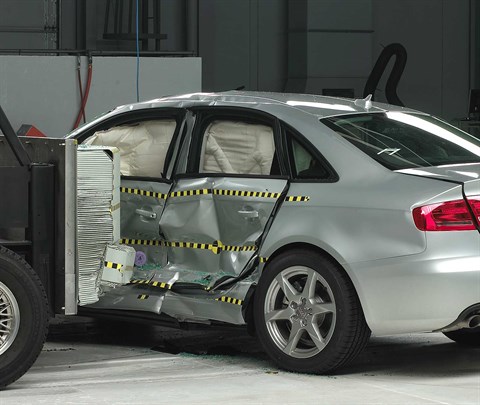
View of the vehicle and barrier just after the crash test.
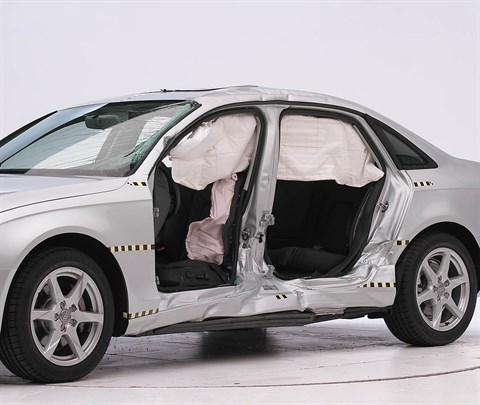
View of the vehicle after the crash with doors removed, showing the side airbags and damage to the occupant compartment.

Smeared greasepaint shows where the driver dummy's head was protected from being hit by hard structures by the side curtain airbag.

Smeared greasepaint shows where the rear passenger dummy’s head was protected by the side airbag.
Measures of occupant compartment intrusion on driver side
| Test ID | CES0843 |
|---|---|
| B-pillar to longitudinal centerline of driver's seat (cm) | -13.0 |
| Negative numbers indicate the amount by which the crush stopped short of the seat centerline. | |
Driver injury measures
| Test ID | CES0843 |
|---|---|
| Head HIC-15 | 234 |
| Neck | |
| Tension (kN) | 1.2 |
| Compression (kN) | 0.0 |
| Shoulder | |
| Lateral deflection (mm) | 39 |
| Lateral force (kN) | 1.5 |
| Torso | |
| Maximum deflection (mm) | 46 |
| Average deflection (mm) | 37 |
| Maximum deflection rate (m/s) | 3.58 |
| Maximum viscous criterion (m/s) | 0.89 |
| Pelvis | |
| Iliac force (kN) | 2.9 |
| Acetabulum force (kN) | 1.7 |
| Combined force (kN) | 4.4 |
| Left femur | |
| L-M force (kN) | 0.5 |
| L-M moment (Nm) | 150 |
| A-P moment (Nm) | 42 |
Passenger injury measures
| Test ID | CES0843 |
|---|---|
| Head HIC-15 | 114 |
| Neck | |
| Tension (kN) | 0.3 |
| Compression (kN) | 0.4 |
| Shoulder | |
| Lateral deflection (mm) | 24 |
| Lateral force (kN) | 1.1 |
| Torso | |
| Maximum deflection (mm) | 24 |
| Average deflection (mm) | 21 |
| Maximum deflection rate (m/s) | 1.66 |
| Maximum viscous criterion (m/s) | 0.21 |
| Pelvis | |
| Iliac force (kN) | 0.1 |
| Acetabulum force (kN) | 2.6 |
| Combined force (kN) | 2.6 |
| Left femur | |
| L-M force (kN) | 1.2 |
| L-M moment (Nm) | 163 |
| A-P moment (Nm) | -58 |
Roof strength
Rating applies to 2009-16 models
Tested vehicle: 2010 Audi A4 2.0T Premium 4-door 2wd
| Overall evaluation | |
|---|---|
| Curb weight | 3,523 lbs |
| Peak force | 16,197 lbs |
| Strength-to-weight ratio | 4.60 |
Head restraints & seats
Seat type: Power leather seats built after Sept 2008
| Overall evaluation | |
|---|---|
| Dynamic rating | |
| Seat/head restraint geometry |
| Seat type | Power leather seats mfg after Sept 2008 |
|---|---|
| Geometry | |
| Backset (mm) | 36 |
| Distance below top of head (mm) | 23 |
| Seat design parameters | |
| Pass/fail | Pass |
| Max T1 acceleration (g) | 13.9 |
| Head contact time (ms) | 53 |
| Force rating | 1 |
| Neck forces | |
| Max neck shear force (N) | 11 |
| Max neck tension (N) | 307 |
About the head restraint & seat test
Currently, IIHS tests apply only to front seats.
